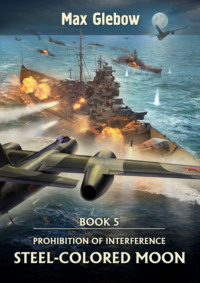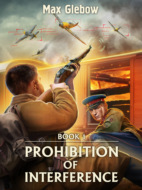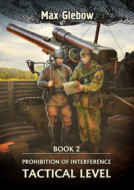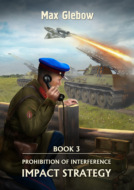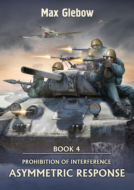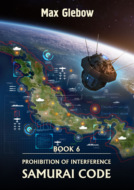Kitobni o'qish: «Prohibition of Interference. Book 5. Steel-colored Moon»
Chapter 1
The Second Shock Army went forward in the direction of Luban, and my corps was left to guard the left flank of the breakthrough in the area, directly adjacent to the west bank of the Volkhov River. Realizing the magnitude of the problem, Colonel General von Küchler decided not to strike immediately at the base of the ledge formed by the Soviet offensive, but instead concentrate his efforts on slowing the advance of Klykov's army.
As a result, there was a temporary lull in my area of the front, and to be honest, I was only happy about it. My corps lost a quarter of its personnel and more than a third of its tanks. There was almost nothing left of the Kudryavtsev’s Air Regiment. Virtually all of the surviving planes were in need of repair, and the regiment, which did everything in its power in this operation, had to be taken immediately to the rear to be re-formed. On top of that, Colonel Tsaitiuni's artillerymen had used up all the special ammunition. The Katyushas' regiment had a similar situation – there were only one full salvo of thermite shells left. So I was not anxious to go into battle, and the command of the Volkhov front was well aware that my corps needed a respite to replenish the weakened units with men and equipment.
After shifting all current affairs to my subordinates, I ordered them not to disturb me unless absolutely necessary and closed myself in my office in one of the surviving buildings of the former school of aviation mechanics in the village of Selishchi on the eastern bank of the Volkhov River. Here, at last, I had the opportunity to quietly deal with the new information that had so unexpectedly fallen on my head right in the middle of the combat flight.
I knew I wouldn't have much time. A call from Moscow or from the front headquarters could come at any minute. I had no doubt whatsoever that I would not be left as commander of this corps, which had successfully completed its offensive task and was now on the defensive for a long time. Nevertheless, I still counted on a few hours of pause.
The Moonbase artificial intelligence report gave me contradictory feelings. The power of command is a good thing, of course, except that I seem to be in command of the wreckage and the ruins. The rebel cruiser did its job very well. In fact, only some rooms of the lower level of the base remained relatively intact, and by no means the most important ones. Probably some of the destroyed utilities and equipment could have been repaired, but the computer did not have accurate data about the state of some sectors and even entire levels of the base, as the few surviving repair drones were unable to get through the many meters of debris of polymer concrete that had formed when the slabs collapsed.
I immediately had to give up hope that there was a reserve fighter, or at least some unarmed science team ship, somewhere in a distant warehouse. Such a machine, even into a laid-up mode, would immediately respond to the base's central computer and send it a concise report on the status of key systems.
In fact, what the drones that survived the attack managed to do should have been considered a rare stroke of luck, after all, they were deprived of a unified leadership and isolated from each other in dilapidated rooms and corridors. The artificial intelligence of one of the eight surviving repair drones, having rather modest capacities, took over the coordination of the brigade, that had spontaneously formed, and in ten months, the drones managed to partially restore power to the base and, most importantly, to get to the central computer unit and start up two of its seven system modules. From here on, the repair progressed more smoothly. The base AI took charge of the work, in addition, it had much more authority to interrogate and subdue equipment and systems that remained at least partially functional, than the repair drones.
The long-range communications system was beyond repair, which was to be expected – the rebels destroyed it first, using no less than a dozen long-range missiles for the purpose. Things were a little better with short-range communications, although at first the weak transmitters of the repair drones could hardly reach even the satellites orbiting Earth. These devices were designed to operate within the Moonbase, and communication systems were not their strong suit. Once the central computer started up, the problem was solved, but as it turned out, the repair drones couldn't go any further in rebuilding the base on their own.
Heavy equipment was needed to remove the rubble. The only well-protected multipurpose tunneler available at the base, was buried under tons of soil and ceiling debris in one of the hangars on the second underground level. It responded to the central computer and even reported no serious damage, but the machine was not able to get out from under the rubble on its own, though it tried, so it was not to be expected to help in the foreseeable future.
Neither the arsenal's computer nor the transmitters of the combat equipment it contained responded to requests. This meant that the boarding robots and other autonomous mechanisms were destroyed or severely damaged, or they would have been in contact long ago.
The base housing unit was also badly damaged, but there was nothing of particular value to me there. That said, there were a lot of interesting trivia surviving on the base. For example, repair drones retrieved and repaired two ROCK-M rifle systems from under the rubble that belonged to fallen infantrymen from the base guard company. True, the use of these weapons required a battle suit with an exoskeleton, and none of them survived, at least in the part of the base accessible to repair drones.
The rest of the equipment found and recovered by the drones left me indifferent, at least while I was here on Earth, and it was there at the Moonbase. Nevertheless, my opportunities did increase considerably.
First, I finally gained access to the network of reconnaissance drones that had been operating autonomously all this time on the planet's surface. And secondly, now I was able to draw information not from the extremely degraded databases of the escape pod's computer and the small brains of the satellites in orbit, but from the vast stores of the base's central computer, which contained data on the history of the Sixth Republic and other human civilizations, including details of their pre-space-age technology.
But even that was not all. The artificial intelligence of the Moonbase's central computer was orders of magnitude greater than anything I've had at my disposal up to now. For example, it simply would not have allowed the situation which my air convoy, that delivered supplies to the Rzhev Pocket, got into. The escape pod computer could not adequately assess the threat posed by the German anti-aircraft and searchlights ambush, which was scattered over a large area, and the Moonbase AI would have immediately warned me of the danger.
Similarly, the ability to analyze the information collected by ground drones has increased very significantly. These small and very different mechanisms, covered with powerful camouflage fields, penetrated into the most secret and carefully guarded bunkers, military factories, closed laboratories and any storage of secret documents. While the central computer was down, they functioned autonomously, continuing to carry out tasks received before the attack on the base. Now the control of the drone network was back in the hands of the artificial intelligence, ready to begin purposefully collecting information, and exactly the kind of information that was important to solve the tasks set by the scientific and military command of the Moonbase, which at the moment was me in one person.
Unfortunately, drones could not perform any tasks other than reconnaissance. The prohibition of interference was not invented at the Moonbase, but in much higher spheres, and in addition to the instructions and regulations which it just permeated, it was taken into account in the creation of research equipment. The drones had no weapons or dual-purpose devices. The designers have done everything possible to ensure that the users of land probes have as few opportunities as possible to influence the course of the civilization under study.
Colonel Niven, by his order, lifted my ban on interference. Apparently, he had extraordinary powers in that situation, since the artificial intelligence of the Moonbase did not question the legitimacy of the decision. And now I have not heard any comments from the central computer about my actions on the planet. The AI was ready to obey my orders, although, frankly, I was wary of its resistance. It even stressed me out to a certain extent. What on earth had to happen for the impartial artificial intelligence to allow itself to obey the order of Colonel Niven, who clearly violated the directives of a higher command?
“Central computer, get on the line,” I demanded.
“I'm on the line,” a soft answer whispered in my head.
“Change to a woman's voice.”
“Is it up to me to choose?”
“No. There was a woman named Letra on the base's science staff. A month before the rebel attack, she left the base and flew to the central worlds.”
“Do you confirm the choice?”
I shuddered. The last question came in the voice of my ex-girlfriend. All the intonations were imitated so precisely that it seemed to me as if Letra were beside me, and if I only looked around, I would see a woman whose fate I had not known for almost a year.
“Yes,” I affirmed the choice and could not refrain from asking a question that plagued me in the first months after landing on Earth, “Is anything known about her fate after the beginning of the mutiny?”
“Research Engineer Letra has been recalled from the Moonbase to the Central Republic Academy for a new assignment. The database has confirmation of her departure for Metropolis. The transport ship Bark-86 was supposed to send a report to the base's navigation system on the successful completion of the first hyperjump, but it never made contact.”
I stared out the window in silence for a while. I was in pain. I hadn't even expected such a reaction from myself, thinking that all my feelings for Letra had long since burned out, especially if I recall the circumstances of our parting. Still, I was very attached to that girl at the time, and her disappearance from my life was a great loss to me. We were too different in both education and social status. I could see that she felt good with me, and I felt easy and comfortable in her company, but our relationship had no prospects, which was confirmed when a request came to Letra's name from the Academy. She didn't want to sacrifice her scientific career for a simple lieutenant, and we never once discussed such a possibility – everything was clear as it was.
Of course, these experiences were now perceived as something long gone, but they linked me to my past life, which I could not and did not want to give up completely.
“Your name is Letra now,” I said, suppressing a sigh.
“Accepted.”
“I want a summary of events in Metropolis and the Sixth Republic colonies in the last month leading up to the attack by a rebel cruiser on the Moonbase.”
“What kind of events are you interested in?”
“Anything that has to do with the mutiny and the attack on the base. I am interested in the reasons for this madness and its scope.”
“The data on the causes is incomplete. Long-distance communications reported outbreaks of rebellion in all the major colonies. Pockets of uncontrolled and unmotivated aggression began to emerge all over the place almost simultaneously. They were accompanied by inadequate behavior of citizens, which bore the signs of virtual psychosis in an extremely severe form.”
“How did it manifest itself?”
“Individuals and organized groups of citizens, including military, government officials and law enforcement officers, acted aggressively and deliberately, in the full belief that they were in virtual simulators and practicing training tasks, set by their commander's office. Many citizens thought they were in the game and doing game tasks. Initially, the behavior and motivation of different groups differed greatly, but regardless of the initial drive forward, all those affected by psychosis quickly found common ground with each other, accepting the same concept of what was going on, and did not perceive the arguments of people not affected by psychosis at all, considering them as bots or extraneous characters.”
“That is, a fleet officer, confident that he leads his ship in a training battle on a virtual simulator, and a gamer he encounters, hunting digital monsters with a club, understood each other perfectly?”
“Yes, they did. And gamers were quick to abandon their game scenarios and adopt the legends of those ill persons whose virtual worlds were closest to reality, i.e., police officers and military personnel.”
“So the entire crew of the cruiser that attacked the Moonbase went crazy?”
“This is not a completely accurate term. In their own way, all these people were perfectly normal. They just stopped distinguishing between the real world and the virtual world. Or rather, the virtual world became more real to them than the real one.”
“But who made them attack ordinary people? They must have received someone's orders! How could an officer of the Sixth Republic in his right mind normally accept the training task of storming his own metropolitan system? And our base?! All senior officers in the Fleet know why we study underdeveloped civilizations. How can one explain such a learning task, as the destruction of one's own research station? Who needs to practice such skills, and why?!”
“They consider ordinary people to be infected, and dangerously so, with the possibility of transmitting their mental illness to others. It was as if their consciousness was turned inside out, transferring everything that had happened to themselves to citizens who had not fallen under the influence of virtual psychosis.”
“But who set their tasks, coordinated their actions, led their fleets and armies? Wait a minute, though… I think I understand. They united, using regular fleet, police and army communications systems and built their own vertical chain of command, as if there was no virtual psychosis. Reality was different for them.”
“That's about the way it happened. At first there was chaos, but then those who fell ill organized themselves very quickly, outstripping ordinary citizens, even the military and law enforcement officers. True, not everywhere. In some colonies sick people were quickly isolated, and then the army and fleet put up serious resistance to the rebel forces.”
“Where did this disease come from?”
“It is believed that this is an undocumented and unaccounted for negative effect of the "VIRT-N" technology with a pseudo-infinite number of virtual degrees of freedom. The manufacturer promised complete indistinguishability from reality, but the new virtuality proved to be stronger for human consciousness than the real world. This effect was not immediately apparent. They were in such a hurry to bring this technology to market that they limited the trials to three months, while more time was needed for the accumulation of critical changes in the user's neural connectivity system. And it also needed a jolt – some kind of peak load on the brain, which would switch the perception of the world from real to virtual, that is, replace one world with another.”
“And what was the trigger?”
“The launch of the galactic hypernet. After it went live, the time spent by an average user in virtuality increased by a third. The release of a number of new-generation games specifically tailored to the VIRT-N technology was timed to coincide with the launch of the unified network. This proved to be sufficient.”
“What happened next?”
“Mankind split in two. There were fewer rebels, or rather sick people, but they were much more motivated and had absolutely no fear of death, although they did not seek it – quite expected behavior for someone who thinks he is in a game or a training battle where it is a shame to die, but death is not real.”
“Who was winning the war when the rebel cruiser attacked the Moonbase?”
“There is no information. The colonies stopped communicating and disappeared from the hypernet one by one. A wave of rebellion swept even the outlying independent planets. Metropolis went silent a week before the Moonbase was hit. I have no more recent data.”
“After all, we killed ourselves… There was no outside factor. It was the same as with everyone else before us, only we lasted a little longer.”
“It is premature to speak of the complete death of civilization. Some part of the population may have survived, but my prediction algorithms allow me to say that with a 98 percent probability the Sixth Republic has ceased to exist as a single interstellar state. The war led to the mass death of qualified specialists and the destruction of the most important scientific, technological and educational centers. In the coming decades, those who have survived will be in for a technological setback of two or three hundred years, with possible further regression.”
* * *
Henning von Tresckow hated the Nazis in general and Hitler in particular, but this did not prevent him from serving honestly in the Wehrmacht. At the age of sixteen, Henning volunteered for the army and fought on the fronts of World War I. He finished the war as a lieutenant and Knight of the Iron Cross.
In 1936 von Tresckow graduated from the Military Academy and was assigned to the Operations Directorate of the General Staff. For the Polish campaign he received the Iron Cross First Class, went through France and participated in Operation Barbarossa.
He categorically did not welcome the two-front war, nor did he welcome the repression of Jews and Communists in Germany and the occupied countries. His superiors appreciated von Tresckow, but were openly wary of his anti-Nazi views, so he was not at all surprised by the summons to his immediate superior, nor by the first words of General Gersdorf:
“Colonel, be careful what you say. You are a competent officer, but you have to take modern realities into account. The shootings of Jews and Communists are protested by many here, but few risk expressing their indignation so openly.”
“Understand, Herr General,” von Tresckow stubbornly refused to admit his mistake, “Germany will finally lose its honor, and this will be felt for hundreds of years. The blame for this will not be placed on Hitler alone, but on you and me, on our wives and children.1”
“Don't speak so loud, Colonel,” Gersdorff grimaced. “You're putting me in a terrible position. I couldn't agree more with what you said, but your behavior draws completely unnecessary attention. Let's stop this conversation immediately. I hope it's not too late. I called you here for a reason. A certain Colonel Richtengden from the Abwehr wants to see you.”
“And what does counterintelligence need from a humble staff officer?” von Tresckow grinned wryly, but the General saw concern in his eyes.
“I hope it has nothing to do with your intemperate words, Colonel,” Gersdorf looked away. “Officially, Richtengden said he wanted to talk to you about the actions of some Russian during the fighting for the Dnieper last September.”
Von Tresckow nodded, showing that he had heard the answer. The occasion was strange, and hardly the real reason for the visit to the front by a high-ranking Abwehr officer. The Colonel was well aware of this, as was his immediate superior.
Colonel Richtengden had not arrived alone. Beside him in the room where Treskov was invited, an officer vaguely familiar to Henning with the rank of major was present. Tresckow had definitely seen him somewhere before, and for some reason it seemed to him that this man can not be here.
“Don't you recognize me, Herr Oberst?” the Major smiled. “I saw you at von Kleist's headquarters near Kremenchuk during the forcing of the Dnieper. Does that ring any bells?”
“Erich von Schliemann!” Tresckow could not believe his eyes. Now he remembered where he knew the face from. “But you were captured! You were captured by those Russian saboteurs who caused so much trouble to the First Panzer Group.”
“You have a good memory,” Schliemann nodded, “You and I barely spoke at the time, but you remembered everything you needed to know. I can feel the grip of a real staff officer.”
“But how…”
“With your permission, I will omit the details, Herr Oberst,” Schliemann's smile disappeared from his face. “Let me just say that I have indeed been in captivity, and I did not like what I saw there. But we are not here to discuss my memories.”
“I understand that,” nodded Tresckow.
“We are aware of your views, Colonel,” said Richtengden, who had been quiet until then, “You don't hide them much.”
“So that's the real reason for your visit after all,” Tresckow grinned mirthlessly, “But why the Abwehr? I thought the Gestapo was in charge of such matters.”
“Well, in this matter, the secret police really should have acted more carefully,” Richtengden glanced pointedly at Tresckow, “In your case, they clearly underperformed.”
“What do you mean by that?” An unpleasant chill ran down Henning's spine.
“First of all, your contacts with secret opposition groups aiming to remove Hitler from power,” Schliemann shrugged. “After all, surnames like Gördeler and Stauffenberg should tell you a lot.”
“I don't understand you…”
“You understand everything perfectly well, Colonel,” Tresckow was interrupted by Richtengden sharply, but without any threat in his voice. “I could name a dozen more names. However, why shake the air? You'd better check out a couple of curious documents.”
At Richtengden's nod, Major Schliemann held out a thin folder to Tresckow. Henning carefully read two sheets of typewritten text and looked up at the Abwehr officers.
“Am I under arrest?”
“As you quite rightly pointed out, Colonel, we are not from the Gestapo, so you can forget about the arrest,” answered Richtengden dryly, “But from now on I would advise you to be more careful with your words. Now we're going to ask you some questions about the Russian marksman, you witnessed the hunt for him in September, and I would be very grateful if, for anyone who asks you what the Abwehr wanted from you, you would confine yourself to that part of our conversation.
And here's the other thing. In a few days you will be transferred to Berlin, to the headquarters of the tank army being formed, with General Rommel in command. We recommended you to Colonel General Halder as a very promising staff officer, and he hopes that your appearance in the capital will benefit the common cause of our victory over the enemies of the Reich. Am I making myself clear enough?”
“More than enough, Herr Oberst,” von Tresckow nodded, feeling that the extreme nervous tension was beginning to release him, gradually being replaced by entirely different feelings.
To deflect suspicion from his comrades and relatives, he attempted to fake his death in battle. Once on the neutral strip, von Tresckow opened fire with a pistol and then blew himself up with a grenade. This helped for a while, but later investigations revealed his involvement in the conspiracy, and von Tresckow's relatives were subjected to reprisals. Von Tresckow's words about Germany's loss of honor quoted in the book were indeed said by him to a fellow officer.
